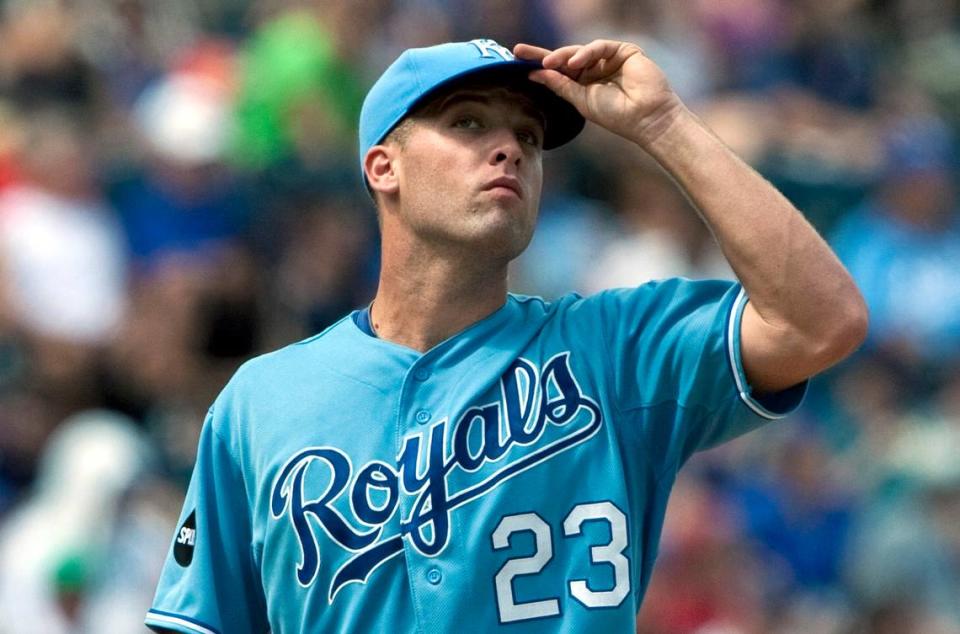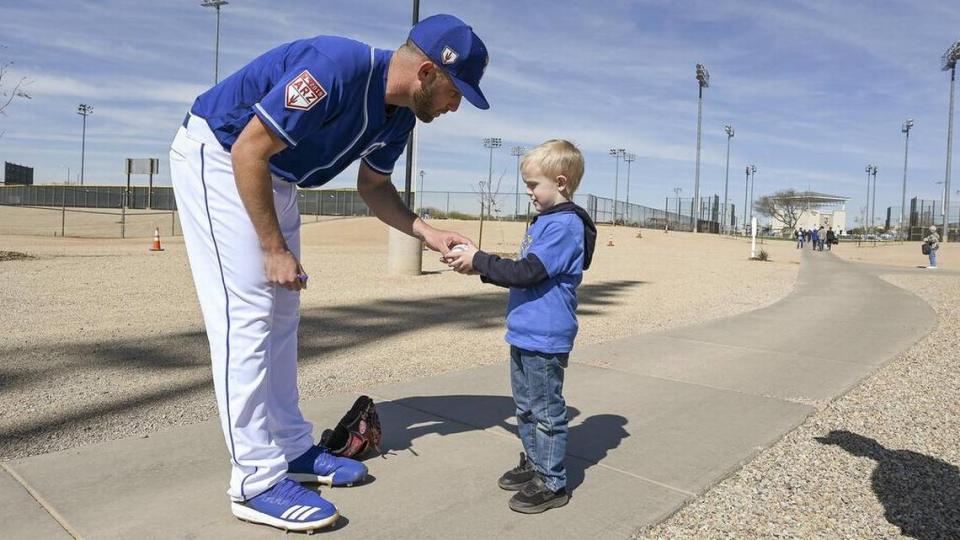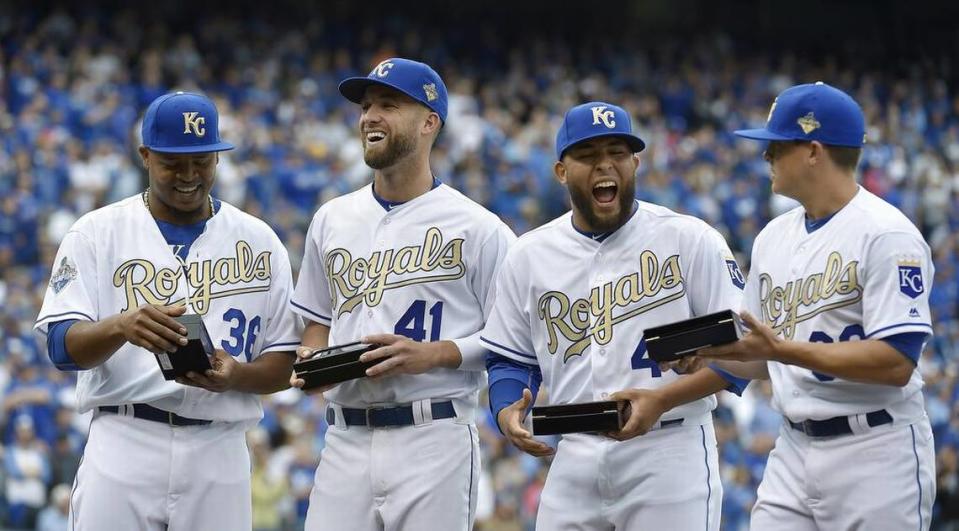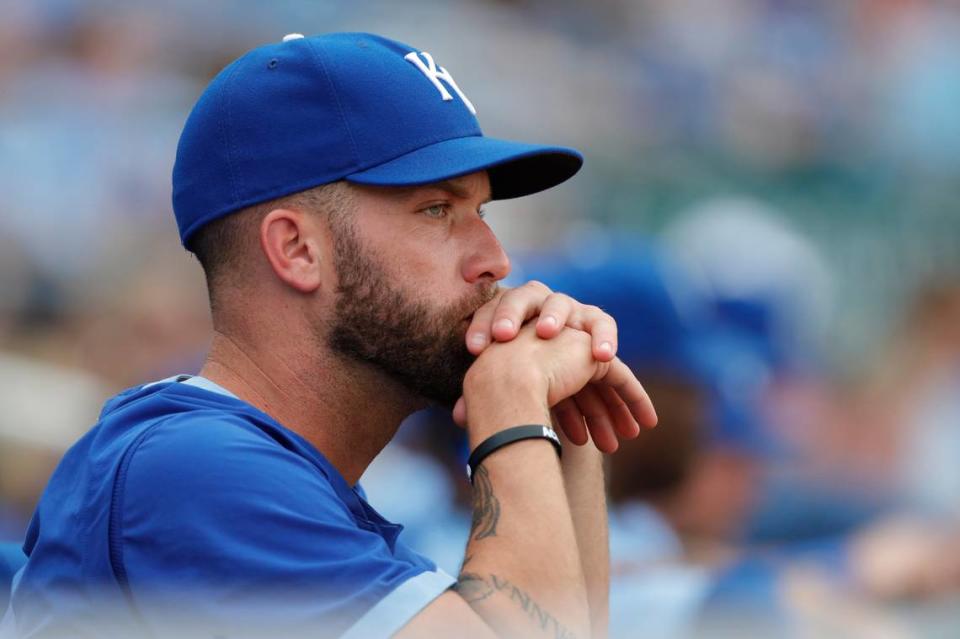Danny Duffy was a most real Royal and should be treasured in Kansas City after trade
During a visit with Danny Duffy’s parents at his childhood home in Lompoc, California, a few years ago, our talk turned to how much he loved the Los Angeles Dodgers when he was growing up … if not before: In a closet of his memorabilia hung a Dodgers baby jacket that once fit the boy who at age 9 in 1998 wept and wept when they traded Mike Piazza to the Marlins.
Nearby among commemorative baseballs acquired through the years was one inscribed by former Dodger manager Tommy Lasorda at a pre-draft workout in 2007: “To Danny,” it said, “a future Dodger.”
So Duffy’s mother, Deanna, tried to console him by suggesting he “just squint” to blur the Royals font and colors with those of the Dodgers when Kansas City drafted him in the third round that year.
But it’s funny how things unfold. Now that he’s finally realizing that deferred dream after signing off on the Royals trading him for a player to be named later, you can bet the guy who would come to proclaim “bury me a Royal” is carrying some agony over this, too.
And happy as we are for him, and much as we hope he might still end his career here after he plays out his contract at the end of the season, it’s a poignant feeling for anyone who knows him here.
Mostly because he was never just a baseball player, essential as he was in that early wave of general manager Dayton Moore’s regime that would rise to back-to-back American League championships and win the 2015 World Series.
It’s because he was the most real Royal there was, a three-dimensional, soulful, pensive and vulnerable person considered the ultimate teammate by former Royal Eric Hosmer … and, as Moore put it on Thursday night, by hundreds of others during his time here.
Indeed, he was a joy to be around for anyone, including fans and the media, whom he could regale and illuminate about anything from Kobe Bryant to dogs to his penchant for marathon walks.
Sometimes, his upbeat way was all about laughter. He could pull hilarious pranks, and who’ll ever forget the bear suit bit and “fur … sure” with Joel Goldberg?
You could also see it on display at any given time in the clubhouse. He’d even poke fun at baseball rituals. Like the one about the media being supposed to ignore a pitcher on the day he was starting a game. Once when the media were entering on a day he was starting, Duffy flipped a shirt up over his head as if to not be seen … and then spoke.
The thing about humor, though, is that sometimes it’s mean or a shield for saying something nasty and acting like it was just a joke.
And Duffy was born and raised too kind, sensitive and compassionate to let that edge into his repertoire. And all those traits are what really define the 32-year-old who was bullied as a child and in 2019 opened up to The Star’s Sam McDowell about the silent pain of his battles with anxiety and depression — a gift to others he sought to help.
“I’m only telling you this because I want someone else who has gone through it to understand it’s not just them,” he said then. “I’m not trying to give you a sob story. I’m just trying to tell you this is a real thing, and some of us out here are dealing with it, man.”
Like all of us, he has his flaws and has known his share of personal defeats. In 2010, under emotional duress, he left the game. In 2017, he was arrested for driving under the influence in Overland Park that reflected what he later called a “brutal set of coping skills.”
Some may sneer at those as if they were character issues.
But we see those episodes, and particularly what he learned from them, as a reflection of a broader humanity that affirms his character many times over.
Through any adversities, Moore said Thursday, Duffy was always accountable and transparent and committed to self-improvement.
To say nothing of what we know to be a constant commitment to making things better for others, from his $1 million gift to his high school to his sincere dedication to charitable enterprises such as Noah’s Bandage Project that helped make him the Royals’ nominee for the 2018 Roberto Clemente Award honoring the player who best represents the game through extraordinary character, community involvement, philanthropy and positive contributions.
If you want to know about his pure tenderness, though, it’s well-encapsulated in his unforgettable response to the death of teammate Yordano Ventura.
On the bleak January day in 2017 when Ventura died in an accident in the Dominican Republic, Duffy went to Kauffman Stadium to console fans.
Standing near then-teammates Christian Colon and Ian Kennedy at a candlelight vigil attended by hundreds, Duffy said, “This is amazing. We know y’all loved him, and we loved him, too. … We’ve got to stick together through this.”
As he walked away later, Duffy hugged fans, telling strangers, “We’re going to get through this together” and to “stay strong.” And in the months after, Duffy made it a cause to gather a trove of meaningful memorabilia to send to Ventura’s mother, Marisol, in the Dominican Republic.
That became part of a moving storyline this spring, when Duffy surrendered his No. 41 to the incoming Carlos Santana and the Royals brought Ventura’s No. 30 back into circulation … with the blessing of his mother.
“We all loved him, man: That dude had our backs more than anybody has ever had another teammates’ backs,” Duffy said. “And he made it very clear that he did.”
In an entirely different way, Duffy always had his teammates backs, too. So he’ll remain like a family member to Moore, not to mention many others around here. And maybe one day he’ll be back.
For now, though, he’s finally headed where he meant to be from the start after a detour he’ll always treasure.
And a path we should be grateful for, too, especially because of the human touch he brought with him that tends to be in short supply in people of his stature.
“We truly love Danny,” Moore said, adding that the time with him is “forever a part of our memory bank. And we’ll cherish those.”

 Yahoo Movies
Yahoo Movies 






































